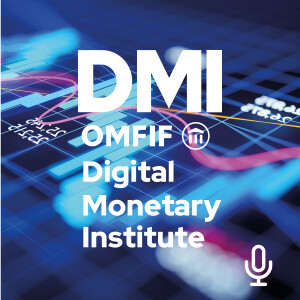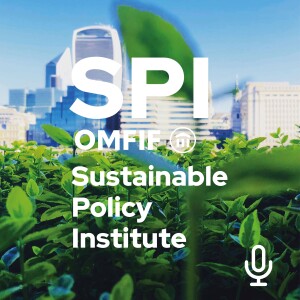
247.7K
Downloads
594
Episodes
Subscribe to the OMFIF podcast for the latest news and insight on financial markets, monetary policy and global investment themes. Published weekly, the podcast features input from a range of academic experts, central bankers and investment professionals. Visit our website at www.omfif.org.
Subscribe to the OMFIF podcast for the latest news and insight on financial markets, monetary policy and global investment themes. Published weekly, the podcast features input from a range of academic experts, central bankers and investment professionals. Visit our website at www.omfif.org.
Episodes

Tuesday Feb 28, 2023
How Austria is breaking ground with green T-Bills
Tuesday Feb 28, 2023
Tuesday Feb 28, 2023
Markus Stix, managing director at the Austrian Treasury, speaks to Burhan Khadbai, head of content at OMFIF’s Sovereign Debt Institute, about the launch of the world’s first short-term sovereign green bond programme.
Stix talks about the reception of Austria’s first rollover of green Treasury bills, plans to issue green commercial paper and how the Treasury has shared its experiences with other sovereign debt management offices looking to follow in Austria’s footsteps.

Tuesday Feb 21, 2023
Tuesday Feb 21, 2023
Though the battle to rein in inflation continues in most major economies, monetary authorities are now beginning the much more uncertain process of quantitative tightening. As central banks drain liquidity from the financial system and unwind their balance sheets, what impact will this have on markets and government financing? Which markets will be particularly sensitive to tightening? What are the risks that may hinder policy-makers’ ability to implement QT as planned? Bill Papadakis, investment strategist on Lombard Odier’s macro team, speaks with OMFIF Chief Economist Neil Williams and Economist Taylor Pearce on the prospects for QT.

Tuesday Feb 14, 2023
The Bank of Japan’s yield target tensions
Tuesday Feb 14, 2023
Tuesday Feb 14, 2023
Even as its liquidity provision passes its 25th year, the Bank of Japan looks unlikely to tighten monetary policy in step with other central banks until deflation is beaten and the Ministry of Finance can end its reliance on ultra-low yields to control government debt costs. Neither of these looks likely to happen in the new governor’s five-year term starting on 9 April, and possibly beyond it.
Neil Williams, chief economist, and Taylor Pearce, economist at OMFIF, discuss the tensions around the BoJ’s yield target and the impact that even more quantitative easing may have. With central bank independence looking blurred and fiscal costs a growing consideration in monetary decisions, is Japan is the best test case we have? https://www.omfif.org/2023/02/japan-25-years-of-adding-liquidity-and-counting/

Thursday Feb 09, 2023
A solution for stablecoin and CBDC interoperability
Thursday Feb 09, 2023
Thursday Feb 09, 2023
There are myriad digital currency payment projects that offer efficient settlement within their networks, often improving speed and lowering costs relative to incumbent systems. One such project, the Universal Digital Payments Network (“UDPN”), which was launched last month in cooperation with GFT, goes further and promises to deliver interoperability between digital currencies and their respective systems. DMI editor Lewis McLellan is joined by David Creer, Global Digital Assets and CBDC Lead at GFT, and Alexander Feenie, Managing Partner at Chavanette Advisors, to discuss the Universal Digital Payments Network.

Tuesday Feb 07, 2023
What starts with ESG does not end there
Tuesday Feb 07, 2023
Tuesday Feb 07, 2023
OMFIF’s survey of global public pension and sovereign funds revealed there is clear appetite among public investors to increase allocations to environmental, social and governance assets. But a major barrier, noted by 75% of respondents, is insufficient data or information. Adnan Memon, chief operating officer and head of data & analytics at Citi Business Advisory Services, joins Nikhil Sanghani, OMFIF’s managing director of research, to discuss the data challenges, as well as opportunities, facing ESG investors.
They explore the specific data hurdles regarding ESG investing, how investors are using data differently when considering sustainable assets and the future of ESG as a distinct asset class. They also look into the benefits of a deeper understanding of supply chains, which often isn’t limited to ESG-related risk management.
Find more details in Adnan Memon’s article, which was featured in our Global Public Pensions 2022 report.

Thursday Jan 19, 2023
Meeting net zero targets with the UNEP
Thursday Jan 19, 2023
Thursday Jan 19, 2023
Eric Usher, head of the United Nations Environment Programme Finance Initiative, joins Emma McGarthy, head of OMFIF’s Sustainable Policy Institute, to discuss how the UNEP is supporting the financial sector through the challenges of increasing disclosure and reporting requirements, transition planning and impact investment strategies. They discuss how the financial sector can scale up sustainable capital and asset allocation, the need to engage policy-makers to introduce further regulatory practices for the real economy’s transition as well as the rising focus on nature finance.
For a more in-depth examination of disclosure requirements, transition finance and regulatory expectations, join us in London on 22-23 March at our annual SPI symposium. To see our confirmed speakers and to register to attend, click below.
https://www.omfif.org/spisymposium2023/

Thursday Jan 12, 2023
OMFIF outlook: what’s in store for 2023?
Thursday Jan 12, 2023
Thursday Jan 12, 2023
OMFIF Economist Taylor Pearce and Chief Economist Neil Williams delve into what to look out for in the year head in this lightning round podcast. They cover the monetary and fiscal balance for governments and policy-makers, the resulting impacts on growth, currency and asset (re)allocation and heightened geopolitics.

Monday Jan 09, 2023
EU bonds: towards sovereign status
Monday Jan 09, 2023
Monday Jan 09, 2023
Siegfried Ruhl, hors classe adviser to the director-general for budget at the European Commission, talks with Clive Horwood, OMFIF’s managing editor and deputy CEO, about the European Union’s borrowing plans for 2023. He discusses the new unified EU-Bonds funding approach, efforts to improve liquidity in EU debt, the role of primary dealers and the continued commitment to green bond issuance.

Wednesday Jan 04, 2023
20 Minutes Coffee with Neil Williams and Antonio Curia
Wednesday Jan 04, 2023
Wednesday Jan 04, 2023
Neil Williams, chief economist, OMFIF, joined Antonio Curia, senior executive director of Wimmer Family Office, to provide a quarterly update on macroeconomics and a relevant view from policy-makers around the globe.

Wednesday Dec 21, 2022
Reflecting on COP27: scaling up climate finance and ensuring a just transition
Wednesday Dec 21, 2022
Wednesday Dec 21, 2022
While COP26 revolved around what needs to be done to secure global net zero by 2050, COP27 focused on how to move from pledges to implementation. Mobilising finance is critical to delivering urgent action and has become one of the key aims of Egypt’s COP27 presidency. This year’s climate summit intended to amplify the voices of developing countries and raise the topics of sovereign debt for nature and climate investment, reducing the cost of green borrowing, scaling up financing for both adaptation and resilience, loss and damage, and ensuring a just transition.
In this podcast, OMFIF’s Sustainable Policy Institute Head Emma McGarthy talks to Alex Michie, Head of Glasgow Financial Alliance for Net Zero (GFANZ), on the key outcomes of COP27, the state of climate finance and moving from commitments to tangible action, GFANZ framework for transition planning and driving co-operation, convergence and forging the path to COP28.
